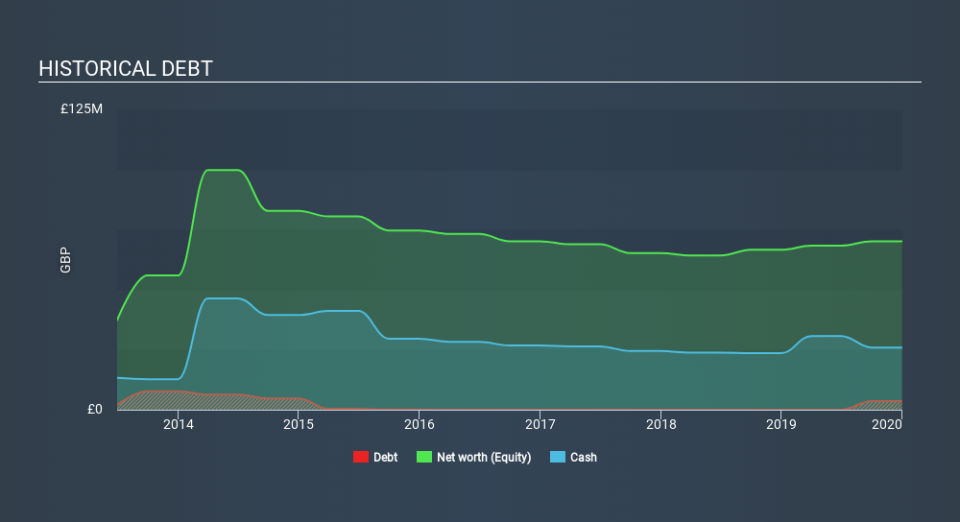Is Parkmead Group (LON:PMG) Weighed On By Its Debt Load?

Some say volatility, rather than debt, is the best way to think about risk as an investor, but Warren Buffett famously said that 'Volatility is far from synonymous with risk'. It's only natural to consider a company's balance sheet when you examine how risky it is, since debt is often involved when a business collapses. Importantly, The Parkmead Group Plc (LON:PMG) does carry debt. But the real question is whether this debt is making the company risky.
When Is Debt A Problem?
Debt assists a business until the business has trouble paying it off, either with new capital or with free cash flow. Part and parcel of capitalism is the process of 'creative destruction' where failed businesses are mercilessly liquidated by their bankers. While that is not too common, we often do see indebted companies permanently diluting shareholders because lenders force them to raise capital at a distressed price. By replacing dilution, though, debt can be an extremely good tool for businesses that need capital to invest in growth at high rates of return. When we think about a company's use of debt, we first look at cash and debt together.
Check out our latest analysis for Parkmead Group
How Much Debt Does Parkmead Group Carry?
You can click the graphic below for the historical numbers, but it shows that as of December 2019 Parkmead Group had UK£3.60m of debt, an increase on none, over one year. However, its balance sheet shows it holds UK£25.9m in cash, so it actually has UK£22.3m net cash.
How Strong Is Parkmead Group's Balance Sheet?
We can see from the most recent balance sheet that Parkmead Group had liabilities of UK£4.99m falling due within a year, and liabilities of UK£13.7m due beyond that. On the other hand, it had cash of UK£25.9m and UK£1.42m worth of receivables due within a year. So it actually has UK£8.60m more liquid assets than total liabilities.
This excess liquidity suggests that Parkmead Group is taking a careful approach to debt. Due to its strong net asset position, it is not likely to face issues with its lenders. Simply put, the fact that Parkmead Group has more cash than debt is arguably a good indication that it can manage its debt safely. When analysing debt levels, the balance sheet is the obvious place to start. But ultimately the future profitability of the business will decide if Parkmead Group can strengthen its balance sheet over time. So if you want to see what the professionals think, you might find this free report on analyst profit forecasts to be interesting.
Over 12 months, Parkmead Group made a loss at the EBIT level, and saw its revenue drop to UK£5.1m, which is a fall of 47%. To be frank that doesn't bode well.
So How Risky Is Parkmead Group?
We have no doubt that loss making companies are, in general, riskier than profitable ones. And the fact is that over the last twelve months Parkmead Group lost money at the earnings before interest and tax (EBIT) line. And over the same period it saw negative free cash outflow of UK£4.7m and booked a UK£1.5m accounting loss. But the saving grace is the UK£22.3m on the balance sheet. That means it could keep spending at its current rate for more than two years. Overall, its balance sheet doesn't seem overly risky, at the moment, but we're always cautious until we see the positive free cash flow. There's no doubt that we learn most about debt from the balance sheet. However, not all investment risk resides within the balance sheet - far from it. Take risks, for example - Parkmead Group has 4 warning signs we think you should be aware of.
If you're interested in investing in businesses that can grow profits without the burden of debt, then check out this free list of growing businesses that have net cash on the balance sheet.
If you spot an error that warrants correction, please contact the editor at editorial-team@simplywallst.com. This article by Simply Wall St is general in nature. It does not constitute a recommendation to buy or sell any stock, and does not take account of your objectives, or your financial situation. Simply Wall St has no position in the stocks mentioned.
We aim to bring you long-term focused research analysis driven by fundamental data. Note that our analysis may not factor in the latest price-sensitive company announcements or qualitative material. Thank you for reading.

